- Home
- Jane Arbor
Consulting Surgeon Page 6
Consulting Surgeon Read online
Page 6
“Really you should try to sleep!”
“I mustn’t sleep!” And because Ursula sensed that the old lady feared that on the far side of sleep she might wake to find that she had lost even more of Foster, she judged it best to yield.
She drew a chair to the bedside and with Mrs. Damon’s hand in hers she began talking of the things which she had not thought it could interest anyone to hear.
There seemed no reason now why she should not mention that she was a nurse, so she began at that end of her story, explaining too about Mrs. Craig and Coralie, making their looks and their characters live with a deft touch or two of narrative. Telling of Ned as a very old friend, coming at last to Denis and her father, and going back further still into her schooldays to add a funny story against herself at which came to the end with a modest: “Well, I think that’s all about me!” she realized that she had found no place in the tale for Matthew Lingard. And he had wanted it supposed that they had known each other for a long time! He had even introduced her by her Christian name.
Mrs. Damon was saying: “Thank you, my dear. Now I feel I really know you. You seem to have brought so much courage to living. But you have come through, haven’t you? You are happy now, both in your work—and in Matthew?”
“In—Matthew?” Ursula’s echo was one of blank surprise.
“Well, aren’t you? Or do you feel you can’t be completely happy until you are married to him? Is that it?”
“But, Mrs. Damon—Mr. Lingard and I aren’t engaged to be married! We aren’t...”
Lucy Damon’s eyes clouded once more in perplexity. “I’m sorry, my dear. I thought you were. I thought Matthew meant that.”
“He wouldn’t have told you so,” said Ursula gently.
“No, of course he didn’t. I realize that now. It was just my foolishness. You must forgive me—I don’t seem able to grasp anything clearly tonight. Only you see, Matthew has always promised me that before he told anyone else he would bring to me the girl he meant to marry. And as he has never brought anyone here before, I naturally thought...”
With the last words her voice trailed away towards a drowsiness against which her will could fight no longer. Ursula did not permit herself to reply, lest a single word from her should check the effect of the sleeping-draught which was about to do its work. She watched the old lady drift, unresisting now, towards sleep, and then sat on for a long time, until the fingers holding hers slackened at last and she was able to withdraw her hand. From the long strain of being held in one position her arm ached almost unbearably, but as she went softly out of the room she was more aware of a great mental weariness. It was if she had given out more of the essence of herself than her reserves would stand. She felt crowded about by the stresses of the last few hours, and she longed for sleep, though she doubted whether it would come easily.
Outside in the softly lighted corridor Matthew Lingard sat waiting for her. Somehow she had known he would be there. His head rested upon his hand, and for a moment she felt for him the protective tenderness which the very defencelessness of sleep always aroused in her. But he was not sleeping, for as she approached he was at once alert, a question in his eyes.
“She is asleep,” said Ursula simply.
“Good.” His tone was brisk and matter-of-fact. “I felt I could rely upon you. You’ve done a good job, and you’ll go straight to bed yourself now, won’t you?”
She summoned a faint smile. Really, by his manner, they might be conducting a military operation! “I’ll be glad to, I think,” she said. “How is Mrs. Foster Damon?”
“Asleep too, I hope. She should be, with the dose I gave her. By the way, I’ve had a supper-tray put into your room for you. If you need anything else, just ring.”
“Thank you. I’m so tired that I don’t believe I shall need anything at all.” As soon as she had spoken she felt ashamed of having admitted to the weakness even of fatigue. She would not appeal to him for any sympathy he did not give willingly! But she hungered for a word, all the same.
He went with her to the door of her bedroom. “You’ll be all right now?” he asked abruptly.
“Yes, of course. Goodnight.”
“Good night. And—bless you.” Momentarily his fingers closed about her upper arm in a pressure that hurt. Then he left her, striding away towards the head of the stairs without looking back.
Inside her room she leaned back against the panels of the closed door as if in complete abandonment to her weariness. But now she was only physically, deliciously tired. It was as if, at the instance of that brief word of gratitude and at his touch upon her arm, the drained virtue of her spirit had begun to flow back, filling her with a heady exaltation.
Now she knew she would sleep. And she felt hungry too. She took the covers from the food—a cup of iced soup, chicken breasts and salad, and some black grapes—telling herself that his thought for her had provided it. She had longed to be appreciated, and her present mood was determined to make much of that brief “Bless you” and of that contenting pressure on her arm.
Before she slept scraps of memory of the day’s happenings began to piece themselves into a pattern, from thoughts of Ned and the surprise of finding Matthew Lingard at the flat upon her return, through recollection of the long miles by which she and he had come, through to the unexpectedness of finding Averil Damon here before them, and forward at last to that strange mistake which Mrs. Damon’s clouded understanding had made—
Sleep came at last. But into her dreams she carried a single memory that was too absurd to survive beyond the dawn. The frail voice murmuring: “Matthew promised he would bring to me the girl he meant to marry. And he has never brought anyone here before...”
CHAPTER FOUR
THE SUN was blazing into the pleasant breakfast room to which Ursula was shown the next morning. Matthew Lingard was there before her, reading the newspaper upon the cushioned window-seat. He rose as she entered, indicated the two covers laid for them and drew out a chair for her, saying: “We are to breakfast téte-a-téte so will you pour the coffee? Neither Aunt Lucy nor Averil will be down.”
“How did you sleep?” he went on as she poured out and handed him his cup.
“Splendidly, thank you.”
“Good. I was afraid you might be overtired, but, of course, I should have guessed you would bring efficiency even to the business of sleep!”
Last night he had been grateful and gentle. Why then should he resort once more to the kind of barbed criticism she had come to expect from him? She felt annoyed and a little hurt. But she would not show it. Instead she challenged lightly: “Really, Mr. Lingard, on the scant evidence you have you can’t possibly know whether I am efficient or not!”
“Oh, but I can. You must give me credit for some observation. I judge that you are painstaking, meticulous, thorough—”
“All of which sound like dictionary meanings for ‘pernickety’!”
He nodded carelessly. “They could be, if they stood alone. But perhaps you have some weightier qualities to balance them. I hope so.”
“Such as?”
But his only reply was a baffling shrug. “On our short acquaintance I wouldn’t presume to enumerate them. We mightn’t agree on their desirability.”
“And that shall be the end of that topic,” thought Ursula, pressing her lips firmly against the temptation to pursue it. She was beginning to be wary of the way in which their conversation seemed always to drive dangerously towards a razor-edge of argument which sharpened little but their tempers. Her own temper, anyway. He had cooler control of his.
After a pause she told him that when breakfast was over she would like to ring Mrs. Craig to tell her of their safe arrival and that letters could be sent to her at hospital, as from that day.
“But you weren’t considering going in to hospital today, were you?”
“I thought so,” Ursula hesitated.
He crumpled his napkin and stood up. “My dear girl, I thought we were clear about this
? That you would stay as long as your leave permitted if you were needed here?”
“But am I needed?”
“Of course. You were of great use and comfort to Lucy last night. She told me so this morning. And you can continue the work you have begun, if you will. The point is—will you? Or do you regret having sacrificed the rest of your leave to it?”
“Of course not,” she retorted. “But I mustn’t intrude. It’s different for you. You have the standing of your relationship behind you here. But I should hate to feel that Mrs. Foster Damon should think that Mrs. Damon was turning to me for comfort instead of to her. They have only each other left, after all.”
“Why should Averil feel anything of the sort?” he demanded.
“Didn’t you feel last night that she resented her mother-in-law’s withdrawal into herself? She was inclined to be bitter about it, I thought.”
“But how could that affect you?”
“She might resent my intrusion—or any success I might have with Mrs. Damon.” (How else to interpret the glance of darting hostility which Averil had thrown briefly in her direction?)
Matthew Lingard made a gesture of impatience. “Sheer imagination. Averil wasn’t herself last night, and she can’t but be grateful to you in the end. You must realize that Lucy and she don’t know each other very well. Foster was abroad during most of his marriage, and Averil was with him. They will have plenty of time to find a common ground of sympathy after you have gone back to hospital. And you can take it from me that for these few days my aunt will need you. Will you stay?”
“Of course.”
“Then that’s settled. You have to be back on duty—when?”
“By Saturday evening.”
“I’ll see that you are there. Incidentally, I am taking my own first Clinic on Tuesday. Meanwhile, we shall both have our work cut out here. For one thing, Averil seems to have fled from Egypt in such a hurry that she must have left chaos behind her. I don’t suppose she had ever troubled her head about Foster’s affairs, and if they hadn’t even a solicitor, I must take her up to my own man in London. Between them, Aunt Lucy and she are likely to give us a difficult few days, I think.”
“Theirs is infinitely the harder part,” Ursula said gravely.
“Infinitely, of course. And the pity of it is that there is so little one can do for them that time will not do better in the end.”
For Ursula, no part of the following days was to be as difficult as the moment of her telling Mrs. Damon that she must return to duty on Saturday evening.
As she had feared, it was she, not Averil, whom the old lady wanted constantly with her; it was for Ursula that she began gradually to recall her sad little memories of her son, and it was Ursula who sat beside her each night until she fell asleep.
Her absorption of the girl’s time and attention inevitably threw the care of Averil upon Matthew and, on the rare occasions when Ursula and Averil met, Ursula was uncomfortably aware that the young widow’s feeling was hardening against her. Through no fault of her own—merely at Matthew Lingard’s suggestion—she was being forced to take with Mrs. Damon the place Averil should have. For that reason—though for no other, since she was growing to love Lucy Damon—she felt it was a good thing that she must leave Shere Court before Averil’s resentment of her should flare to open enmity.
On the Friday Matthew took Averil to London by car, and when the four of them met at dinner that night Ursula had had no opportunity to ask him whether Mrs. Damon knew that she must leave next day. So as they sat over dessert she chose her moment to say as lightly as possible: “Well, by this time tomorrow I shan’t be here, shall I?”
Indirectly she had addressed Matthew, but it was Mrs. Damon’s distressed voice which broke in upon his reply. “Not here, Ursula dear? But you can’t leave me yet! She can’t, can she, Matthew? I need her so much!”
What would he reply? She knew that she must return to duty on time. But previously he had urged his aunt’s need of her so vigorously that she wondered how far she could look to him to back her up now.
She need not have been afraid. When he spoke to Mrs. Damon it was with the gentle compassion he always had for her, but still with firmness. He said: “Ursula must go, Aunt Lucy. She has been able to be with you because she has had leave until now. But that is up tomorrow, and she must go back.”
“I know—and it was sweet of her to give up her leave to me. But something could surely be arranged, if the authorities knew how necessary she is to me? Why, you could do something about it yourself, Matthew!”
Ursula, glancing at her, was surprised by the little autocratic gleam in the blue eyes. Clearly Lucy Damon, gentle as she was, had a will that had not often been thwarted. But Matthew was explaining as patiently as to a child: “Aunt Lucy, dear, Ursula is a ward sister, and that means that she has a load of responsibility which I mustn’t ask her to shift, even for you. Don’t think, though, that I’m suggesting that her patients are more important than you are. It’s simply that her work has made them her particular care, where you are not, except through her generosity. Do you understand that that is why we must let her go?”
Ursula looked at him in sheer gratitude. Could this be the same man who had made fun of her “self-importance,” of her “efficiency,” and had ridiculed what he called the “awful majesty” of ward sisters? It was strange—but very heartening—to find him so emphatically on her side now.
Mrs. Damon murmured: “You make it very difficult for me to ask her, Matthew.” Then, turning to Ursula: “I oughtn’t to doubt it, my dear, but are you really as important as he says?”
Before Ursula replied she glanced at Matthew, and caught the familiar, glinting mockery in his eye as he answered the question for her. He leaned forward, his stage-whisper studiedly penetrating as he said: “Important, you ask? Why, she is so important that the whole machinery of the hospital might be expected to creak to a standstill without her!”
Again Ursula had to be grateful to him, for having put the argument on a lighter note, making it easier to discuss without real rancor or further hurt to Mrs. Damon’s feelings. She said laughingly: “You are not expected to believe that, you know!”
“But I could, I think. You are so capable and so sympathetic that I could believe that the welfare of countless people must hinge upon you.”
Ursula shook her head. “Really, only the bit about ‘machinery’ was true. I am no more than one cog in one wheel that must lit and work faultlessly with all the other wheels and must go on doing so, night and day, because the work in hospital never stops. I assure you I’m no more important than that.”
“You are too modest, my dear. But I do see that you mustn’t fail all those other people for my sake. Though that doesn’t mean, does it, that you won’t come to see me just as often as you are able? Matthew, you’ll be coming, won’t you? You could come together—”
Across the words cut the harsh sound of Averil’s chair being thrust back from the table. Averil said stormily: “Well, I think the whole thing is absurd. Matthew, there isn’t a reason in the world why you couldn’t pull some strings, so that Ursula could stay with Lucy for as long as she is needed. I mean, surely even nowadays it is possible to hire nurses, so long as they are well paid?”
There was a moment’s silence. It was Ursula’s instinct to flare at the insolence Averil clearly intended. But, curbing the impulse to retort, she was glad she had done so, for nothing could match the quiet dignity with which Mrs. Damon rose from her place, saying: “Please, Averil, the matter is settled, and if I am quite happy about it, that is sufficient. But I think you should realize that I do not need a nurse, nor has Ursula been here in that capacity. She came as a ‘friend in need’ to me, and because Matthew asked her to. And when she comes again I hope it will be because I ask her to.” With which, and with a smile at Ursula, the old lady laid a hand upon Matthew’s proffered arm, and turned to the door with him. But before she left the room she had one more thing to say. With lip
s which trembled slightly she added: “Incidentally, Averil, my dear, to Foster I was ‘Mother.’ I could have hoped that his wife would call me that too, rather than by my Christian name.”
Ursula could not but admire the simple dignity of the gentle but telling rebuke and of the frail figure which seemed to acquire a stature that had nothing to do with inches. But as soon as they were left together Averil flung petulantly from the table, lighting a fresh cigarette from the one upon her lips as she did so. She declared irritably: “I don’t care. It is absurd that Matthew can’t arrange for you to stay. Why can’t you?”
“I thought Mr. Lingard explained? Because my work happens to be hospital nursing, not private nursing—however well paid!” replied Ursula coolly, not being able to resist adding those last words.
Averil shrugged. “Don’t ask me to see the difference, please. To me it sounds no more than a quibble you have concocted because you don’t want to stay. Though why you don’t when you came readily enough for Matthew’s asking, I don’t know.”
“Why do you want me to stay?” asked Ursula quietly.
“Why?” From where she stood at the fireplace, her back turned, Averil flung round dramatically. “Can’t you see why? Because Lucy doesn’t like me—she never has done. Look at the way she snubbed me just now—about calling her by her Christian name, as if everyone didn’t do it nowadays. But it’s not only that. It is that, from not wanting to talk about Foster at all, she’ll now do little else. It’s Foster, Foster all the while—and I can’t stand it. But there is no reason why you shouldn’t. And if you came as a nurse to her, I suppose you’d have to—”

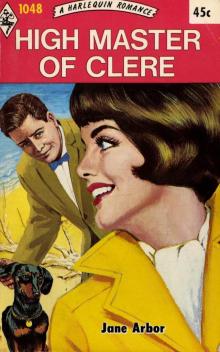 High Master of Clere
High Master of Clere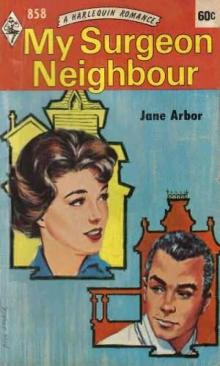 My Surgeon Neighbour
My Surgeon Neighbour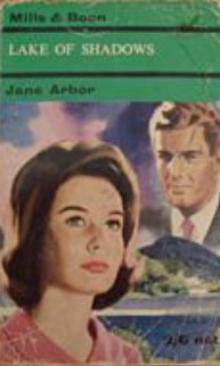 Lake of Shadows
Lake of Shadows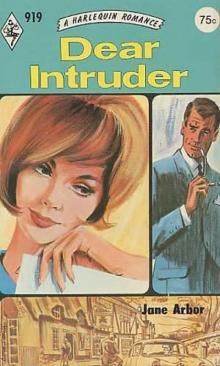 Dear Intruder
Dear Intruder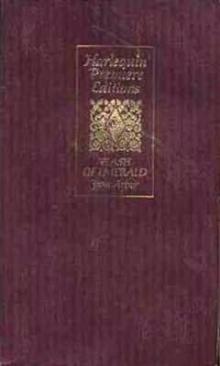 Flash of Emerald
Flash of Emerald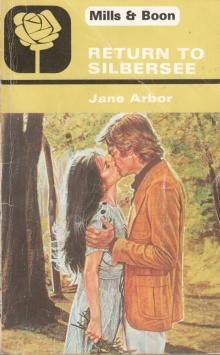 Return to Silbersee
Return to Silbersee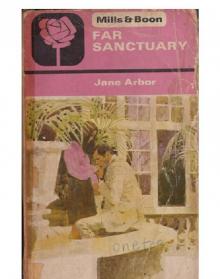 Far Sanctuary
Far Sanctuary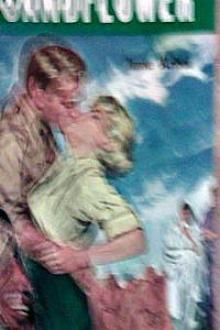 Sandflower
Sandflower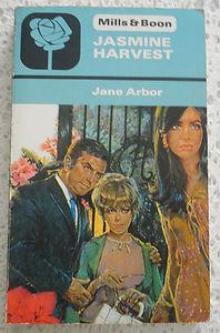 Jasmine Harvest
Jasmine Harvest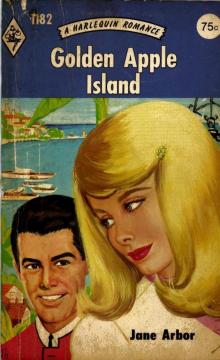 Golden Apple Island
Golden Apple Island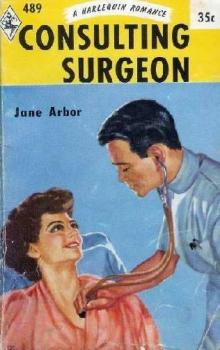 Consulting Surgeon
Consulting Surgeon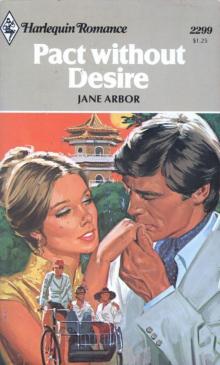 Pact without desire
Pact without desire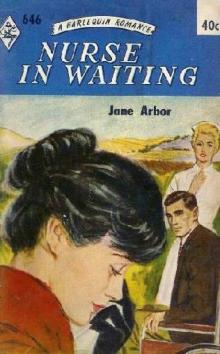 Nurse in Waiting
Nurse in Waiting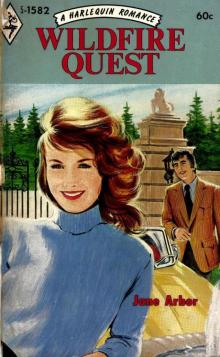 Wildfire Quest
Wildfire Quest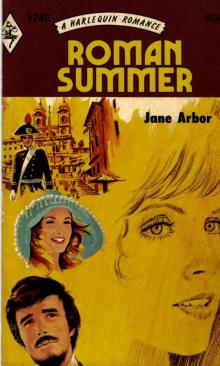 Roman Summer
Roman Summer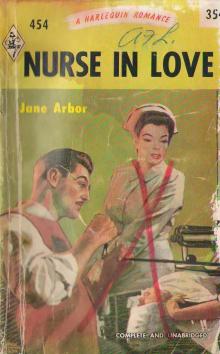 Nurse in Love
Nurse in Love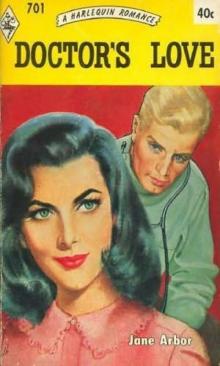 Doctor's Love
Doctor's Love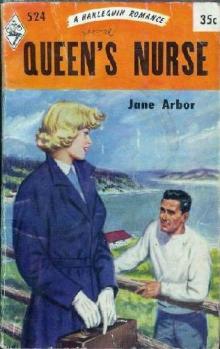 Queen's Nurse
Queen's Nurse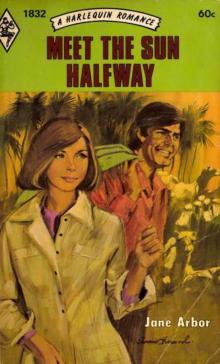 Meet the Sun Halfway
Meet the Sun Halfway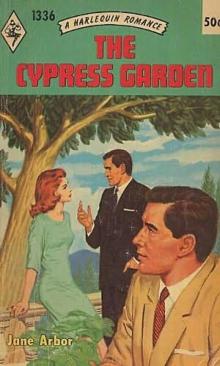 The Cypress Garden
The Cypress Garden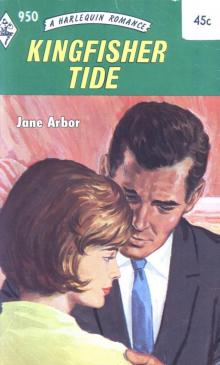 Kingfisher Tide
Kingfisher Tide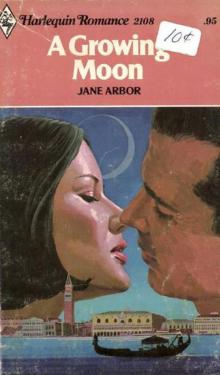 A Growing Moon
A Growing Moon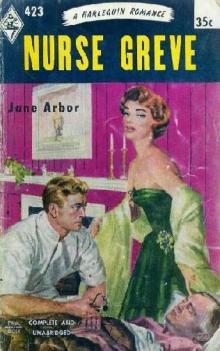 Nurse Greve
Nurse Greve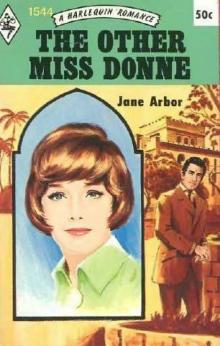 The Other Miss Donne
The Other Miss Donne